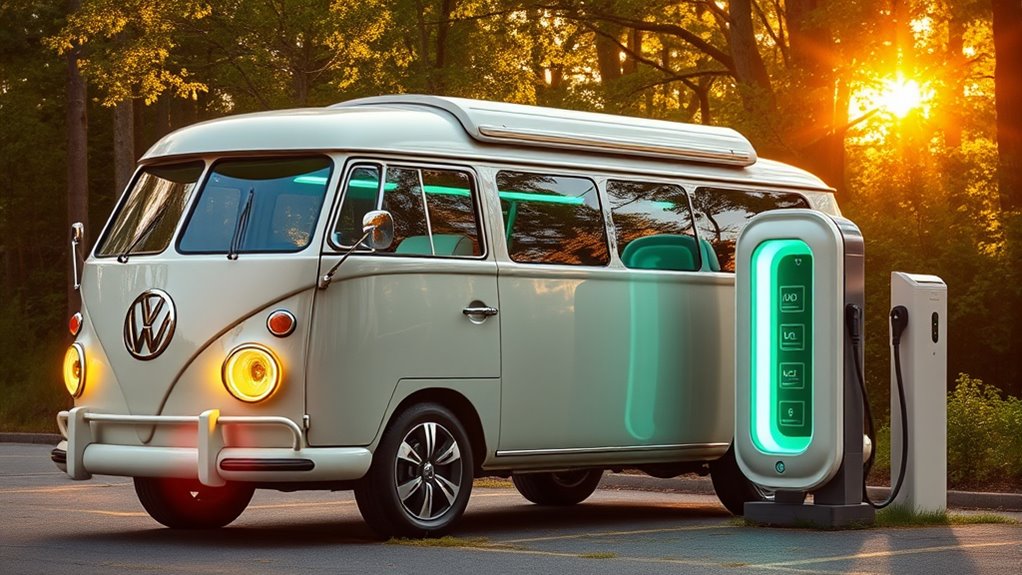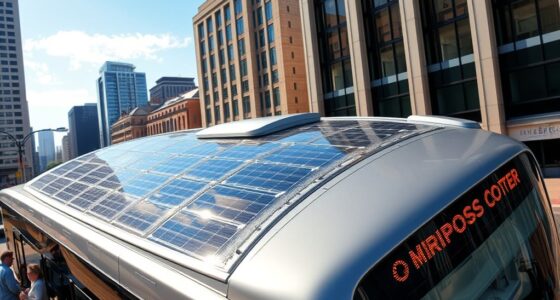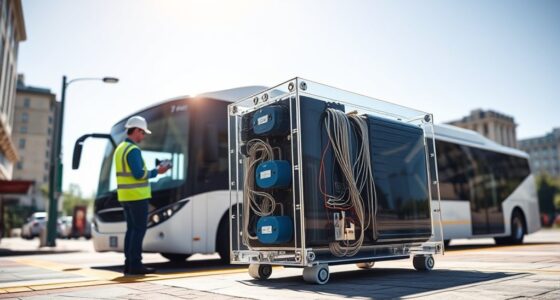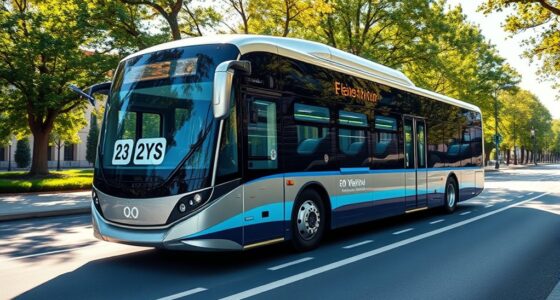Next-generation batteries like solid-state tech and advanced recycling are poised to transform your electric VW bus. You’ll benefit from longer range, faster charging, and improved safety, all while supporting sustainability through responsible material reuse. These innovations also make batteries lighter and cheaper, potentially lowering vehicle costs and expanding charging options. If you want to discover how these advancements could shape your journey, continue exploring what the future holds for electric mobility.
Key Takeaways
- Solid-state batteries offer higher energy density, enabling longer ranges and fewer charging stops for electric VW buses.
- Advanced recycling methods allow sustainable reuse of critical materials, reducing environmental impact and supply chain dependency.
- Next-gen batteries enhance safety by minimizing overheating risks, improving reliability and peace of mind for users.
- Innovations may lower production costs, making electric VW buses more affordable and accessible to a wider audience.
- Compact, efficient batteries facilitate the development of widespread, convenient charging infrastructure, supporting sustainable mobility.

As Volkswagen prepares to revive its iconic buses with a new electric model, breakthroughs in next-generation battery technology are playing a crucial role. These advancements promise to make your future rides more sustainable, longer-lasting, and safer. One of the key innovations driving this shift is solid state batteries, which replace the liquid electrolyte found in traditional lithium-ion cells with a solid material. This change can substantially boost energy density, allowing your electric bus to travel farther on a single charge. Plus, solid state batteries are inherently safer—they’re less prone to overheating or catching fire, giving you peace of mind during long journeys or in busy urban settings.
Simultaneously, the industry is making strides in battery recycling. As more electric vehicles hit the roads, the importance of reusing and repurposing battery materials becomes clear. Instead of letting spent batteries go to waste, new recycling methods extract valuable materials like lithium, cobalt, and nickel, reducing the environmental impact of mining new resources. For you, this means that your electric VW bus isn’t just environmentally friendly when in use; its batteries are part of a sustainable loop, minimizing waste and conserving critical materials. Incorporating environmentally responsible practices like organic seed cultivation can further support sustainability efforts across industries.
The combination of solid state batteries and improved recycling techniques could drastically reshape your experience with electric buses. You might notice that future models will have smaller, lighter batteries delivering greater range, thanks to the higher energy density of solid state technology. This means fewer stops for charging and more time enjoying your journey. Meanwhile, advancements in battery recycling ensure that the raw materials required for these batteries are sourced responsibly, reducing environmental harm and supporting a circular economy. Manufacturers are investing heavily in these technologies, which could lead to more affordable batteries over time, making electric VW buses more accessible to a broader audience.
These innovations also have a ripple effect on the broader infrastructure supporting your electric vehicle experience. With safer, more efficient batteries, charging stations can become more compact and widespread, making it easier for you to find a charging point whenever you need it. Additionally, the push toward sustainable materials and recycling could lower the overall cost of battery production, helping to reduce the price of your electric bus without compromising performance.
In essence, the future of battery technology for VW buses isn’t just about extending range or cutting costs; it’s about creating a smarter, safer, and more sustainable mobility solution. As these cutting-edge advancements become mainstream, you’ll benefit from vehicles that are not only more enjoyable to drive but also better for the planet. With solid state batteries and a focus on battery recycling, the next generation of VW buses promises a cleaner, more efficient ride—one that aligns with your values and your desire for innovation.
Frequently Asked Questions
How Soon Will Next-Gen Batteries Be Available for VW Buses?
You might see next-gen batteries for VW buses in a few years, as manufacturers focus on improving battery recycling and raw material sourcing. These advancements aim to make batteries more sustainable and efficient, speeding up deployment. While exact timelines vary, expect gradual adoption over the next 3-5 years, with ongoing research helping to reduce costs and environmental impact, making your future electric bus ride more eco-friendly.
What Are the Environmental Impacts of New Battery Materials?
Imagine a future where your VW bus glides silently, leaving behind cleaner air. New battery materials promise to reduce environmental impacts, but they still involve mineral extraction that can harm ecosystems. Recycling batteries helps recover valuable minerals, lowering the need for new mining. You can help by supporting sustainable practices, ensuring that as technology advances, it minimizes harm to our planet and preserves natural beauty for generations to come.
Will These Batteries Reduce Overall Vehicle Costs Significantly?
These next-gen batteries could cut vehicle costs through improved energy efficiency and longer lifespan, leading to lower replacement expenses. However, you should consider manufacturing challenges, as integrating new materials and tech may increase initial production costs. Over time, the benefits of cost reduction could outweigh these hurdles, making electric vehicles more affordable. So, while early-stage costs might rise, long-term savings and innovations could profoundly reduce overall vehicle expenses.
How Do Safety Standards Differ for New Battery Technologies?
You’ll find that safety standards for new battery technologies prioritize battery longevity and manufacturing safety. These standards guarantee batteries last longer without risking thermal runaway or fires. Manufacturers implement advanced safety protocols during production, including rigorous testing and quality controls. As a result, you can expect these innovations to improve overall safety, reduce hazards, and extend battery lifespan, making your electric vehicle experience safer and more reliable.
What Infrastructure Changes Are Needed to Support New Battery Types?
Think of the future of EVs as a garden in full bloom; new battery types need special tending. You’ll need more advanced charging stations capable of handling faster, diverse batteries. Upgrading the grid guarantees power flows smoothly, preventing bottlenecks. These infrastructure changes are essential for supporting next-gen batteries, making electric VW buses more reliable and ready to take you on journeys without worry, just like a well-tended garden flourishing.
Conclusion
With next-gen battery tech on the horizon, you’re looking at a future where electric VW buses could soar farther and charge faster, transforming your road trips into seamless adventures. These advancements are like a gust of fresh air, clearing the path to more sustainable and fun travel. As innovation accelerates, you’ll soon feel the thrill of exploring new horizons, knowing that cutting-edge batteries are paving the way for a greener, more exciting journey ahead.









